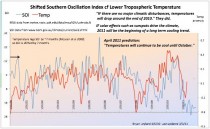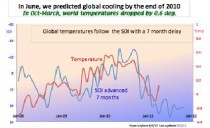May 29, 2011
Food security and climate change
Scientific Alliance
Food security is once again - rightly - a high profile issue. The projected rise of the world’s population to 9 billion or more has been flagged as a concern for some time, but has largely failed to capture the headlines until recently. However, with a series of steep commodity prices rises occurring since 2008, it has risen to the top of the agenda for many policymakers and begun to reach the public consciousness.
The basic challenge is well-known: to feed another two billion people in a world with increasing meat consumption, with minimal use of new farmland. This is compounded by two other factors, the apparent slowing of the historical rate of yield increase from conventional plant breeding and the enthusiasm of governments to divert food crops to produce biofuels.
Based on the IPCC view, climate change is also projected to place further strains on world agriculture. Changing weather patterns are expected to reduce yields or effectively eliminate farming in some marginal areas as they become drier and temperatures exceed the tolerance level for certain crops. To set against this, though, is the parallel northwards move of the limit for crop growth and the likely opening up of large areas of productive land for agriculture, together with the yield-boosting effect of higher carbon dioxide levels (as exploited commercially by greenhouse growers).
Recently there has been a report in the Guardian (Food prices driven up by global warming, study shows) that the negative impact of climate change is not just theoretical but has already been detected. This references Lester Brown’s Earth Policy Institute, specifically Plan B 3.0: mobilising to save society (so – with apologies to non-UK readers - contradicting Marks and Spencer). However, it appears to be based on work to be published in Science by a Lobell et al from Stanford University (Climate Trends and Global Crop Production Since 1980).
Professor Tim Wheeler of the Walker Institute for Climate System Research at the University of Reading and deputy chief scientist at the UK Department for International Development (the only ministry with a prospect of significant budget increases, to the disquiet of some) told the Guardian “The research provides evidence of big shifts in wheat and maize production”. Given his government advisory role, his comments are likely to reflect official thinking.
The article goes on to say “The study, published in the journal Science, examined how rising temperatures affected the annual crop yields of all major producer nations between 1980 and 2008. Computer models were used to show how much grain would have been harvested in the absence of warming. Overall, yields have been rising over the last decades and the models took this into account. The scientists found that global wheat production was 33m tonnes (5.5%) lower than it would have been without warming and maize production was 23m tonnes (3.8%) lower. Specific countries fared worse than the average, with Russia losing 15% of its potential wheat crop, and Brazil, Mexico and Italy suffering above average losses. Some countries experienced lower production of rice and soybeans, although these drops were offset by gains in other countries....The losses drove up food prices by as much as 18.9%, the team calculated, although the rise could be as low as 6.4% if the increased carbon dioxide in the atmosphere strongly boosts plant growth and yields - a factor that is not well understood by scientists.”
Note the reference to computer models: this study is not based on hard data, but a statistical analysis using a number of ‘what ifs’. The premise is, according to the article, that “higher temperatures can cause dehydration, prevent pollination and lead to slowed photosynthesis,” which is one of the thrusts of Lester Brown’s work, mentioned earlier.
Quoting from his Plan B 3.0, “Agriculture as it exists today has been shaped by a climate system that has changed little over farming’s 11,000-year history. Crops were developed to maximize yields in this long-standing climatic regime. As the temperature rises, agriculture will be increasingly out of sync with its natural environment. Nowhere is this more evident than in the relationship between temperature and crop yields.” Most readers will find this an overly romanticised view of farming which takes no account of, for example, the Roman and Medieval warm periods. Looking further at the few references quoted in support, he relies on a handful of relatively old papers and a speech at a 2002 conference on sustainable food security. The only reference to the effect of temperature on yield is a paper which reports lower rice yields with higher night time temperatures. Conclusions about global yields of a range of crops must, we can only hope, be based on firmer evidence than that.
A useful point of reference is the FAO statistical database FAOSTATand there seems little evidence from this to support such conclusions. Over the period 1990 to 2009, the global area of farmland used for cereals production fell slightly, from 708 million hectares to 699 mha. However, over the same period, the cereals harvest rose from 1.95 billion tonnes to 2.49bn tonnes. The increase was not consistent, but neither is there any pattern which could be correlated to average temperatures; the biggest gains have been in recent years.
A similar analysis for the period 1970 to 1989 shows a global cereals harvest increasing from 1.2bn tonnes to 1.9bn tonnes on essentially the same land area. The increase was much higher in percentage terms and also larger in absolute terms than in the more recent period, but we should remember that this was the period of the green revolution, when the introduction of dwarf wheat and rice varieties transformed much of Asia from a region of recurrent famine to one of self-sufficiency (albeit still with unacceptably high levels of poverty and malnutrition).
On a related topic, Oxfam will soon launch a new campaign, called simply Grow, with the ambitious goal of ‘fixing the food system, forever’. It is difficult to argue that Oxfam has not played a very important role for many poor people over the years but, like most of the rest of the development sector, it has become very politicised. The first aim of the campaign - helping people to grow their own food better - is unarguably a good thing, but the fact that there have been decades of such work with little real change to the lives of the poorest suggests that this fails to address the root causes of poverty and food security.
Beyond that, the campaign lapses into idealism, with a wish to create ‘a global food system that takes action when food prices rise beyond the means of poor families, and which stops food companies abusing their power’. A belief in central planning and the superiority of the public sector does not look like a good way forward. And the third strand, to achieve a ‘fair, global deal on climate change...to prevent a devastating impact on agriculture’ simply chimes with the current pessimism among many environmentalists (and, indeed, the political and scientific establishments) and will do nothing to help farmers.
It seems clear that the work of Oxfam, the Earth Policy Institute and the Stanford scientists is underpinned by a world view that takes it as given that humans - or at least, those of us in richer countries - are a blight on the planet, with our supposed dominant effect on the natural climate system simply the most egregious example. We face enormous challenges over coming decades, but we also have a great capacity to overcome them. As a first step, we need to encourage people to remove their blinkers and realise that other views can be equally valid.
May 28, 2011
Climate Progress blog shuts down - all previous comments disappear
Anthony Watts, WattsUpWithThat
It appears the mendacious Joe Romm has been given new marching orders by Center for American Progress Big Brother Blog: “Think Progress”. From what I make of it, it seems the management realized that CP just wasn’t holding much readership, as it looks like the same 30 commenters or so frequent the place. Sooo...the spin is on. Joe’s doing his best to make his forced merger under Think Progress look like a win.

“Prettier”? Heh. Me thinks this is Joe’s “lipstick on a pig” moment.
What is most strange though, is this note about comments disabled.
Not only are comments disabled, they are gone, all of them, from the present to when the blog started in 2006. That may be a temporary condition, but we’ll see. When I moved from Moveable Type back in October 2007 to WordPress.com, everything remained in place, comments and all and is still there today.
You gotta love a guy like that that treats his user community like they don’t exist anymore.
Joe’s last post was about his vision of Memorial Day, 2030
That reminds me to remind everyone (and especially Joe) to be sure to fly your flag this coming Memorial Day, to honor those who gave so much, but have not been forgotten (nor disappeared).
I look forward to seeing more “high quality” climate articles on Think Progress, like this one:

ThinkProgress discussion of the tornado outbreak - click here for the full article. ...and, while the rescue operations were underway, this is how Brad Johnson updated his article - disgusting.

See post and comments.
May 26, 2011
Damn You, Global Warming!
by Doug L. Hoffman, The Resilient Earth
Despite warnings to the contrary, and waning public support, the all purpose boogieman climate change is once again getting credit for the recent spate of natural disasters in the US. Whether its flooding on the Mississippi, rain soaked fields too wet to plant, or rampaging tornadoes laying waste to whole towns the villain behind our misfortune is anthropogenic global warming. Reports from the scenes of devastation are sure to include at least one reference to climate change, which is of course caused by people. In essence, the yammering news media - who always needs a culprit to blame when disaster befalls a group of innocents - has placed the blame squarely back on humanity. That’s right, we are responsible for the tragic deaths of hundreds of people caused by storm, flood and tornadoes. The chattering class once again demonstrates that they have bought the IPCC climate change scam: hook, line and sinker. They would rather mindlessly repeat the discredited memes of climate alarmists than think critically themselves.
The latest round of blaming bad weather on climate change began in mid-winter. Last summer in the Southern Hemisphere brought heavy rains and flooding in many places and bitter winter weather across the Northern Hemisphere. Report after report of unusually heavy snow falls and unusually cold temperatures were accompanied by a steady stream of talking heads and erstwhile experts trying to convince the public that the cold weather was being caused by global warming. Go back more than two or three years and look for predictions that global warming will cause colder winters. In 2007, when abnormally warm winter weather was occurring in Western Europe, the talk was “see, we told you! It’s global warming!” When things began to turn cold the warmists veered uncomfortably close to the truth by stating that warm or cold weather was not proof of climate change.
After several years with cold nasty winters, the alarmists have reversed their field. Now, the cold weather during the past winter, and the unseasonable cool, wet spring here in the US, is a side effect of human caused global warming. Even the disgraced prophet of climate doom, Al Gore, has emerged from his burrow to proclaim: “A rise in global temperature can create all sorts of havoc, ranging from hotter dry spells to colder winters, along with increasingly violent storms, flooding, forest fires and loss of endangered species.”
Now we are being told that the record flood of the Mississippi River was caused by global warming. Never mind that the river rises every year, and it is only the extensive system of dikes and levies that keeps those who live near old man river dry. Or that by restricting the flow of the river, forcing it to remain within a comparatively narrow channel, amplifies the flood level, to the point that when a wet spring does occur and the levies overflow, people who have never experienced flooding get a very rude surprise. Old timers still remember when the Mississippi flooded in 1927, its width exceeding 100 miles in places. Just because some event has not happened in the last 50 or 100 or even 500 years does not mean it isn’t natural. Most natural cycles happen on time scales longer than human lifetimes and human memories are notably fallible over shorter spans.
Those who read the last IPCC report, AR4, might recall one of the predicted outcomes was to be increased desertification. With the soggy spring of 2011, that prediction seems, well, all wet. Naturally, the climate change crowd says the wetter weather is caused by global warming as well. Even when the get the proximate causes correct - the El Nino-Southern Oscillation (ENSO) and the Pacific Decadal Oscillation - there is always that evil global warming lurking in the background, calling the shots. The IPCC party line answer is that climate change makes it wetter where it’s getting wetter and dryer where it’s getting drier.
Most recently the American South and Mid-west has had one of its worst tornado seasons on record. One monster tornado leveled much of Joplin, Missouri, on May 22, causing at least 122 deaths. The massive twister that leveled 30 percent of the town has been rated an EF5 by the National Weather Service and is being called the deadliest single tornado since 1950. Tornadoes have also ravaged Oklahoma, Kansas, Arkansas killing people in all three states.
Is this the work of that daemon global warming? My own local news cast a few nights ago ended with the ominous statement “this is only going to get worse as the climate warms.” Thank you, airhead local news dweeb. Even when an otherwise authoratative source actually gets the facts right they still cannot resist tossing in the scary climate change monster to spice up their report. Case in point: consider this article in MIT’s online Technology Review. Here is the article’s lead paragraph:
Tornadoes have killed more people this year than they have since 1953. This has some wondering whether higher global temperatures might be contributing. The answer: there isn’t a statistical correlation between the number of tornadoes and rising temperatures. Yet scientists predict that climate change will bring increasingly harsh weather, and that’s got some commentators wondering whether this year’s tornadoes, record floods, and droughts, might be connected.
There is no statistical correlation, but yet… what school did the author go to again? This mixing of fact with fiction, science with nonsense, empirical observation with urban legend is typical. Even those who should know better give in to temptation and blame the monsters in the closet or under the bed for every bump in the night. Weather is defined as “the state of the atmosphere at a given time and place, with respect to variables such as temperature, moisture, wind velocity, and barometric pressure.” Bottom line: when it comes to weather something is always changing - that’s what makes it weather!
All the world’s eco-activists and treehuggers - so quick to blame humanity for everything bad that happens - have made common cause with the climate change alarmists. Anthropogenic global warming has become the root of all evil, the cause of every catastrophe. Like all good conspiracy theories, global warming can explain every bad event no matter how contradictory or implausible. And like all good conspiracy theorists, nothing can shake the climate alarmists’ beliefs. As tragic as effects of this spring’s violent weather have been, we need to remember that all of Earth’s creatures, including humans, live here at the sufferance of nature. Instead of yelling “damn you global warming,” climate alamists need to recognize that natural disasters are just that - natural.
Be safe, enjoy the interglacial and stay skeptical.
May 26, 2011
Coup de Grace for Imposed Ignorance
By Joseph A Olson, PE
Thankfully the iron curtain of elitist imposed ignorance is falling. It is most fitting that the perestroika moment for humanity and our new century of truth based reality began with the final and most ambitious of the elitist power grabs, the theater of the absurd global warmists.
In recent weeks the Catholic Church rubber stamped a Papal Announcement on human caused global warming and endorsed the Anthropocene with the threat that ‘humans were going to have to live in the world they have created.’ For those of us with trust in humanity, that moment cannot come moment too soon.
So what would possess the church to create the modern equivalent of the Pontifical Academy Trial of Galileo ? Well, it could be that the wise Vatican investors got an insider’s investment tip that the global warming science was government funded certainty and that the carbon commodity trading would be a guaranteed growth market.
With an estimated 30% of the Nuns & Priests retirement fund ‘invested’ in a commodity that shrank from $100 per ton to $0.05 per ton in 2010, what is a good Pope to do ? It is a clear choice whether to fleece the brothers and sisters of the cloth or the flock. The Pope chose to spare the shepherds and fleece the sheep.
Much has already been written about this greatest of human watershed events since the original Renaissance. Much more will be written before the Nouveau Renaissance is complete. As a lifelong student of science and history, an independent thinker and a latent agitator, I chose to enter this greatest of human debates.
I have been blessed in this venture with trusting web hosts and an equally qualified, dedicated group of science professionals. Science is an iterative process, with properly gathered and analyzed empirical data always guiding the scientist to the hidden truths of reality. Nature may withhold the truth, but readily exposes the lie.
And so it is with ‘Carbon Dioxide caused climate change’ hypothesis, a predetermined outcome that ‘we needed energy taxes’ and a willing group of science sell-outs who would create any hypothesis and data necessary to meet that goal. To accomplish this greatest FRAUD in all human history took an international cast of villains and an elaborate plan.
In his excellent investigation of one critical aspect of the scam, author A W Montford exposes the shabby history of The Hockey Stick Illusion. This book covers the dogged efforts of Steve McIntyre and his associate Ross McKitrick to unravel the deceitful graphic that was to mobilize the carbon tax movement. Montford’s 450 page work is exhaustive, but consider these two quotes:
Climatologists Rosanne D’Arrigo and Gordon Jacoby had produced temperature record based on ten sites out of 36 sites studied. When it was suggested that this might be ‘cherry-picking’ data for a predetermined outcome, Jacoby responded:
“If we get a good climatic story from a chronology, we write a paper using it, that is our funded mission. It does not make sense to expend on marginal or poor data and it is a waste of agency and taxpayer dollars. The rejected data are set aside and not archived.”
Taxpayers funded a wide range of data collection and then the agenda driven gatekeepers destroyed all data that did not fit the required narrative. News of gross statistical errors and selective data use prompted Congress to demand an investigation of the UN IPCC claims. Rather than allow our elected officials to ask embarrassing questions or provide testimony from non-managed witnesses, the great protector of government science fraud, the National Academy of Science offered to investigate the allegations.
After days of testimony that proved the ‘hockey stick’ was at best questionable, the NAS panel “had been forced to rely on the somewhat dubious argument that Mann had used incorrect methods and inappropriate data but had somehow still managed to reach the right answer.” In this case the “right answer” was what the government funded NAS was requested to find by the government.
If the ‘fox guarding the henhouse’ aspect of the government investigating itself sounds troubling, the twisted peer review process is even more disturbing. Montford provides a ‘spider chart’ showing the interconnection of government funded Climatologists being the only scientist to review their own work. As the Climate-gate emails disclose, the ‘hockey stick team’ had no problem retaliating against the editors or the scientific journals who dared oppose the warming mantra.
Given the massive taxation and regulation that was proposed there was the foreseeable problem of scientific opposition. The goal was always to focus all climate behavior on the atmosphere. The highest objective was to demonize carbon dioxide for tax and control purposes, failing that to at least keep the option of aerial spraying for geo-engineering. The debate managers needed a controlled science position to counter the warmists.
Where the alarmist warmists would claim a 3C temperature rise and 3 meter sea level rise, the soon labeled ‘Luke Warmists’ would claim that it would only be 1C and 1 meter sea level rise. The narrative was then reinforced by NEVER confronting the false premise, but only the degree of change. In his article “The Corporate Climate Coup”, historian David F Nobel documents how the elitists created and funded the ‘two sides’ of this faux debate. [1]
The carbon dioxide forcing and back radiation narrative were complete fictitious fabrications. What the warmists and the luke warmist collaborators have tried to claim is that all weather and climate is the result of a human caused trace gas. What is missing are the two great heat sources of the Sun and the Earth’s internal fission. It is fluctuations in these two great energy forces that are the real climate drivers, and humans have no influence over either force.
Many fine scientists have explored the solar factors in Earth’s climate, while I have concentrated my efforts on the under-researched Earth fission factor. I have an extensive lecture series covering this subject in archive at ClimateRealists.com, at CanadaFreePress.com and at my website FauxScienceSlayers.com. My chapter in the co-authored science text, Slaying the Sky Dragon combines and expands this fission research in one location.
As mentioned earlier, science is an iterative process and since the publishing of our epic science book my co-authors, aka “Slayers” have become what science peer review groups should be, an international, interdisciplinary team of professionals dedicated to finding and sharing the truth. We have expanded the number of Slayers and our scope. There has been ongoing research and a number of updates. It is now time to update two of the previous articles.
In late Jan, 2011 the Slayers engaged a group of Luke Warmists in an on-line peer review. The result was that we realized the Lukes where clueless about the Outgoing Longwave Radiation (OLR) that they claimed was trapped by CO2 and then warming the planet. My article, “OMG...Maximum Carbon Dioxide Will Warm for 20 Milliseconds” [2] explained that since OLR moved at the speed of light there could only be very limited ‘dwell’ time between Earth’s surface and outer space.
Fellow Slayer, Dr Nasif Nahle was kind enough to provide the calculations for the total number of ‘absorption/emission’ impacts in this transmission, hence the referenced 20 milliseconds. As the Slayers examined the dynamics of the absorption/emission process it was noted that there is a shift during this process to a longer wavelength and lower frequency energy transmission.
This shift moves the photon out of the CO2 spectrum range, making it ‘invisible’ to CO2 molecules higher up in the air column. This greatly reduced the number of OLR impacts and the transit time. The revised length of time that OLR is delayed by Carbon Dioxide in now less than 5 milliseconds, as explained in “Mean Free Path Length Photons” available here [3].
The next refinement of the Earth fission factor was my article ”Earth’s Missing Geothermal Flux” [4] which describes two previously unrecognized processes where hot ‘elemental’ gases are first converted to liquid and then outgassed in the water column. Both of these processes involve massive amounts of heat exchange.
I will now amend the Missing Flux to add the internal production of Hydrocarbons. As mentioned in ”Fossil Fuel is Nuclear Waste” [5] the Earth produces ‘elemental’ petroleum. This product is molecularly stored energy with nearly a million BTUs per cubic foot. The Earth has 310 million cubic miles of ocean and many millions of cubic miles of stored Hydrocarbon energy from this hidden Geothermal Flux.
The next update to the “Missing Flux” article is courtesy of Geologist Timothy Casey and his article ”Volcanic Carbon Dioxide” [6] which quantifies the massive amounts of ‘natural’ CO2. Casey quotes Hillier & Watts (2007) that there are an estimated 3,470,000 submarine volcanoes worldwide and 4% are considered active.
These volcanoes, along with rift zones release a number of high temperature, high pressure gases which condense. Then, referring to this elemental CO2 Casey say, “under special conditions, it accumulates in submarine lakes of liquid CO2 (Lupton et al 2006; Inagaki et al, 2006)”. We are discovering more of Earth’s secrets everyday and much of what we now know was unknown when the IPCC teams started carving hockey sticks.
Human beings deserve to live in the world we create. But we do not deserve to be ignorant slaves in the diminished world of elitist controls. We will overcome the Climatologist blight on science and the elitist blight on reality. Some of the actors in this episode might just now be realizing that they have been played. My message to all is, wake up and step from beneath this green shadow into Le Claire Nouveau.
May 25, 2011
Global Cooling
By Bryan Leyland
In a peer reviewed paper entitled “Influence of the Southern Oscillation on Tropospheric Temperature” published in 2009, Maclean, de Freitas and Carter established that global temperatures followed the Southern Oscillation Index (SOI) with a lag of between six and eight months. Obviously, this meant that global temperatures could be predicted about seven months ahead.*
What is remarkable about this is that a retired engineer with access to the Internet has been able to make accurate predictions of future climate. Yet, to my knowledge, no computer-based climate model nor any mainstream “climate scientist” predicted this cooling. To me, this is truly remarkable.
Charts showing the the current and the original predictions are given below.

Enlarged.
In June 2010, I published a graph predicting that temperatures will fall sharply around October 2010. Exactly this happened. Since then I have regularly updated the graphs and predictions. As the Southern oscillation index is still in the “La Nina” region, the cooling will, almost certainly, last until late in 2011. As a result, 2011 will be a cool-possibly cold–year.

Enlarged.

Enlarged.
* Unpredictable effects such as volcanoes will affect these predictions. In general, volcanoes cause cooling.
The climate charlatans in the Australian government, universities and media have tried to debunk the paper mentioned, because it dared to offer a natural alternative reason for temperature oscillations and, given the dominant El Nino warm PDO phase of the 1979 -1998 period, the trend upwards.
|








